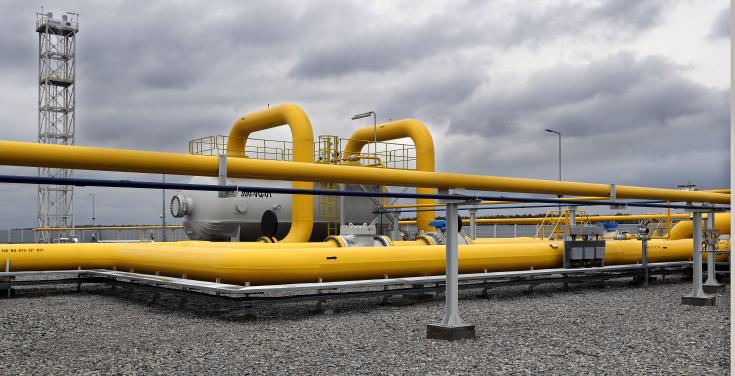Despite Cypriot consumers paying a high price for the delays in the arrival of natural gas, a jump in the market price has played out in Cyprus’ favour.
The island is one of the three EU countries, along with Finland and Malta, which does not use natural gas for electricity production.
With the international price of natural gas soaring by 93% compared to last year, Cyprus’ energy costs are lower than the EU average.
Natural prices this time last year stood at $2.86, climbing to $5.42 per MMBTU (Metric Million British Thermal Unit).
In recent years the long-standing disadvantage of the Cypriot economy has been the island’s dependence and subsequent exposure to fluctuations of oil prices.
Evidently, the shortage of natural gas costs hundreds of millions of euros to the economy and domestic consumers at the cost of the environment.
However, Cyprus is buffered by the rising cost of natural gas, which, combined with the continuous historical highs recorded by the auction prices of greenhouse gases emission rights, has led to an unprecedented energy crisis.
This crisis threatens to reverse the recovery of European economies and mainly threatens tens of millions of Europeans with energy poverty, especially those belonging to vulnerable households and low-income earners.
Mid-week, several EU countries recorded record prices for the wholesale price of electricity, with Cyprus being among the cheapest in the EU.
The most expensive wholesale electricity price was recorded in France, as natural gas prices reached €295.82/ MWh (megawatt per hour).
Italy followed it with €289.27/ MWh and Slovenia with €288.31/ MWh.
Hungary is next on the list with €282.8/ MWh, Romania with €282.80/ MWh, and Austria with €282.69/ MWh.
Germany recorded its highest price on record with €273.89.
In Greece, the wholesale price of a megawatt-hour was €281.03.
The price of energy in Cyprus stood at €170/ MWh.
Prices in the EU this time last year ranged from €77.50 per megawatt-hour to a maximum of €108.92.
The cheapest energy cost for an EU country was recorded in Poland with €163.3/MWh despite using natural gas. It is still benefitting from an exemption given by the EU to countries of the former Eastern bloc.
Cyprus also had free emissions allowances up until 2020.
Energy mix
That was why the cost of purchasing emissions rights skyrocketed for the EAC in the last two years and was transferred to electricity bills.
Cyprus, like other EU countries, has introduced measures to buffer rising energy prices.
A 10% discount offered by the EAC from November to February has essentially been wiped out.
According to EAC’s estimates, businesses and households will be paying 10% more in November than October, as the increase in the cost of energy reaches 20%.
The government has decided to lower the VAT on household electricity bills from 19% to 9% for the next three months, with the Finance Ministry consulting with Brussels on its intention.
Finance Minister Constantinos Petrides said the move is in response to calls to further support households amid an electricity price hike.
However, energy experts do not expect the government’s efforts to pay off, as they warn that energy costs will keep rising.
In earlier comments to the Financial Mirror, Energy analyst Charles Ellinas told the Financial Mirror that bringing down prices with the introduction of natural gas has been hampered by long delays.
The longer it takes, the less the benefits from natural gas, but even when introduced, benefits will be wiped out by the high penalties Cyprus is paying for CO2 emission rights.
“Even though natural gas could reduce EAC’s emissions roughly by 25%, by the time it comes, the price of emission allowances will be close to three times higher in comparison to the level at the start of the project – and increasing,” said Ellinas.
He explained that by then, EAC’s emissions cap will be about 10% lower and will carry on being lowered by over 4% per year, so the impact of gas inherently lower emissions will be eroded.
The energy expert also warned that exports would get more difficult with the EU gradually adopting hydrogen fuel and moving away from all hydrocarbons, including natural gas unless Cyprus adopts strategic planning to combine LNG with renewables.









